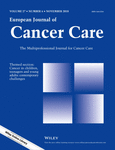Reliability and validity of the Hebrew version of the Nijmegen Continuity Questionnaire for measuring patients' perceived continuity of care in oral anticancer therapy
Funding information
This study was funded by grants from the Israel Cancer Association (no. 20140089), the Israel National Institute for Health Policy Research (no. 2015/84) and from Maccabi Institute for Health Services Research (no.28/2016).
Abstract
To assess the validity and reliability of the Nijmegen Continuity Questionnaire in Hebrew (NCQ-H) for measuring patients' perceived continuity of care in the multiprovider setting of oral anticancer therapy (OACT). Following forward–backward translation of the original instrument into Hebrew, the NCQ-H was administered to adult cancer patients in five oncology centres in Israel, 2–3 months after initiation of OACT (either targeted, hormonal or chemotherapy). Confirmatory factor analysis and Cronbach's alpha were used to assess the validity and reliability of the NCQ-H respectively. A total of 135 patients completed the questionnaire. The postanalysis models for measuring “personal continuity with care provider” (eight items for each provider: the oncology specialist and the primary care physician), and “team/cross-boundary continuity” (four items for each setting: within the oncology team, and between the oncology specialist and the primary care physician) showed good fit for the observed data (root-mean-square error of approximation (RMSEA) = 0.02; RMSEA = 0.015; for each model respectively). Cronbach's alpha was 0.79–0.95 for all subscales. Conclusions. This study provides preliminary evidence for the reliability and validity of the NCQ-H in assessing cancer patients' experience with continuity of care and for its usability in the context of OACT.
CONFLICT OF INTEREST
All authors have no conflict of interest to declare.




